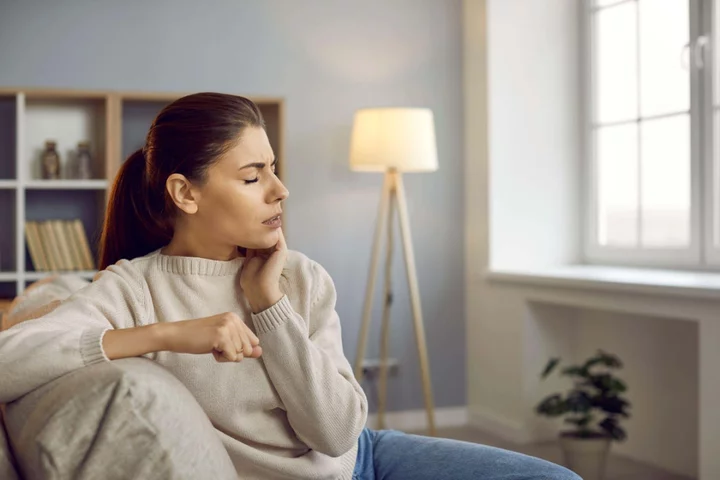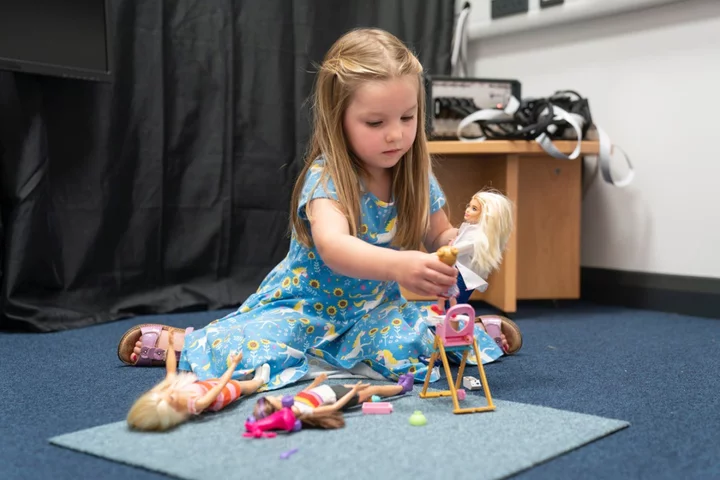
Man with no children sparks debate after ‘judging’ mother who was on her phone at a park
A man has been receiving backlash for giving his opinions on parenting, despite not having any children. Mario Mirante took to TikTok to share a video about what he observed when he watched a mother and her son at a park. “Please watch the whole video before you comment. Thanks,” he captioned the clip, after the original was taken down. “The kid is just playing quietly, not being annoying. I don’t hear a peep from him, he’s just doing his thing on the playground,” Mirante said. “The mom the entire time is on her phone, staring right down at her screen. Doesn’t look up one time.” He explained that as he walked by, he noticed the child sitting on top of the slide. “I hear: ‘Hey mom, watch. Watch, Mom,’” Mirante recalled. “And at the top of her lungs, shrieking like a Velociraptor, this mother screams: ‘One second!!!’” The TikToker claimed the mother yelled so loudly that he stopped abruptly to hear what the problem was. When her child heard his mother scream, Mirante claimed that he looked “terrified” and confused, thinking that he upset his mother. “He wasn’t doing anything wrong,” Mirante said. “Mom never looks up from the screen as the kid goes down [the slide].” Mirante added that he is most definitely “judgeing” the mother based on what he saw in those few minutes. “When your kid isn’t doing something wrong, or in danger, you probably shouldn’t scream at them. It might have some traumatic effects in the future,” he declared, before asking: “Are you guys that attached to your phones?” @mariomirante Please watch the whole video before you comment. Thanks ♬ original sound - Mario Mirante He explained that his original video was taken down due to the amount of negative comments, with people telling him he shouldn’t judge a mother when he is not a parent himself. According to Mirante, some TikTokers told him that “maybe the mom needs a break and she takes him to the park to get that break” or that the mother could’ve been a single mom. Even content creator Abby Eckel stitched Mirante’s TikTok, explaining in a separate video that he has never experienced being the default parent. “A default parent is typically one who is ‘first in line’ when it comes to caring for children, child-related responsibilities, or home-related tasks,” clinical psychologist Amber Thornton wrote in Psychology Today. “If you have never been the default parent, and you don’t know what it’s like to be constantly needed all day, every day if you’re not the one consistently and constantly regulating your child’s emotional needs while also having to regulate your own, which also likely means that you’re having to relearn how to do that because you weren’t taught that as a child,” Eckel said in her TikTok video. “I think it’s wise if you pipe down.” @itsme_abbye If youve never been a parent, please sit down. ♬ original sound - Marriage & Motherhood Many people agreed with Mirante’s video, while others continued to disagree in the comments section. “I am a single mom, I 100 per cent agree with you. Kids remember who is actually PRESENT with them, not glued to their phone, the TV etc etc,” one commenter wrote. “That feeling of ‘but what did I do wrong?’ will stay with that child for a long time. It can be very damaging,” another comment read. “My kid used to say ‘mom’ every five secs. It was a joke in the family. I’d lose my mind about 2 per cent of the time about it. You just caught a bad moment,” one commenter pointed out. Another person wrote: “I thought the same way as you. And then I became a parent. Until you become a parent, you do not understand the struggle.” The Independent has contacted Mirante for comment. Read More Woman filters apartments by price but only parking spaces are in her budget Bride warms hearts after having 104-year-old grandfather serve as ring bearer at her wedding Mother’s TikTok calling out parenting ‘double-standards’ resonates with women everywhere Schoolboy almost dies from swallowing magnets for TikTok challenge Woman shares honest review of New York City apartment TikTok mom slammed after making 5-year-old son run in 104 degree heat
2023-10-03 06:15

Brits think investing is for the super-rich, poll finds
Brits think investing is strictly reserved for the super-rich - with 45 per cent not getting involved themselves. A poll of 2,000 adults found 38 per cent associate it with city bankers, while 21 per cent think it’s the domain of older adults. And 47 per cent admit they’re daunted by the prospect of getting started - with four in 10 not having a clue where or how to begin. A third (32 per cent) also didn’t start taking any active interest in their pension until they were 36 or older. Liz Fernando, chief investment officer for Nest pensions, which commissioned the research, said: “Pensions are a great way to invest your money and watch it grow over time, in the background while you work. “It’s evident that there’s a lot of work to do to demystify perceptions surrounding who can enter the world of investment – it really can be for everyone.” The results also found 49 per cent think the general perception of investing being primarily for the wealthy acts as a barrier for other people who would otherwise want to invest. As almost three-quarters (73 per cent) feel these opportunities should be accessible for people from all income levels. Among the three groups which Brits feel are most underrepresented when it comes to investing are the working classes (46 per cent), young people (34 per cent) and ethnic minorities (29 per cent). For nearly eight in 10 (78 per cent), the fear of losing money makes the idea of investment off-putting. While lack of investing knowledge (52 per cent), uncertainty about the economy (51 per cent) and not knowing where to begin (38 per cent) are among the top fears. But 64 per cent believe more people would be likely to invest – if they could see where exactly their money is going. A third would describe their investing knowledge as ‘bad’ - while 53 per cent feel clear and transparent information about investment options would help ease their concerns. Simpler investment platforms or tools would feel most beneficial for 49 per cent of those polled via OnePoll. And when it comes to pensions, profitability is sought-after for 58 per cent. While investing in sustainable businesses is vital for 29 per cent. More than four in 10 (42 per cent) are connected to their pension through an employment plan – while 15 per cent contribute through a private plan. Liz Fernando for Nest pensions added:” We know your pension pot can be one of the most valuable ways to help secure your future retirement, and it’s right you know where it’s being invested - especially when you’re saving into it for decades”. “We don’t know how the world of finance will look in years to come, but we do know your future self should be grateful that you are adding to your pot.” Read More Four in ten Brits ignore potentially serious eye problems, study finds The exact time Brits find themselves ‘uncontrollably hungry’ revealed Sounds that can help you fall asleep better Exact time Brits find themselves ‘uncontrollably hungry’ revealed Top 10 acts which make people feel more positive Brits feel their mental health declining due to cost of living crisis
2023-10-02 22:27

The curious status of the vasectomy in the UK in 2023: ‘Young, none and done’
In the fallout from last year’s overturning of Roe v Wade, the legislation that secured abortion rights in the US, a great many young American men simultaneously did a quite radical thing. They took to social media to intimately document themselves getting a vasectomy, to prove it was a simple and painless act. One was vegan bodybuilder and influencer Brian Turner, who was certain from around the age of 22 that he’d never want children. He acted on his stance, aged 30, and made some genuinely great content in the process. “The reaction was positive,” he tells me. “A few people commented in disbelief, calling me crazy names or saying, ‘You’re no longer a man – you chopped your balls off.’ But they don’t bother me. I have a thick skin.” It started a global discussion on vasectomies, chiefly around how men can step up and take the burden of contraception away from their female partners forever. Adam, a 35-year-old father of two from Brighton, had the same desire around the same time: “I had a growing guilt about never really fully taking responsibility for contraception. Apart from condoms, all the solutions are for women, and they all seem to have pretty gnarly side effects. It seemed like the decent thing to do, to try to take on the responsibility.” But what of younger British men, who absolutely, definitely don’t want children, who know they want to be what I call “none and done”? For them, although the hurdles are curiously higher and their reasoning more diverse, the same desire to make an informed decision about their body exists. Britain has never had a big national conversation about the vasectomy, the way America – a place where some states even offered them for free in the wake of the Supreme Court’s historic verdict – clearly has in recent years. “The vasectomy was thought to be illegal here until around the Sixties, and only came on the NHS in the early Seventies,” explains Dr Georgia Grainger, a historian of vasectomy. Before this, the concept of men choosing to sterilise themselves was – in her words – “murky”, owing to many of the key doctors and campaigners evangelising the process also being supporters of eugenics. It was actually the beloved broadcaster Michael Parkinson who, in Grainger’s eyes, did the most to burst bubbles on the subject. “He was open about having a vasectomy back in 1972 when it was still very uncommon. He did an interview about it that was on the front page of the first issue of Cosmopolitan magazine. It definitely brought awareness and also dispelled some myths – that it would affect a man’s masculinity or even cause things like a higher-pitched voice”. While the procedure has undoubtedly become more common, I’m not sure that we as a society know a huge amount more about it than in the Seventies. The good news for men is that the procedure is more successful than ever. Doctors reported in March this year that, after surveying 94,000 patients, only 0.2 per cent of men get what’s known as “chronic scrotal pain”. It is generally seen as being more than 99 per cent effective as a form of birth control. The bad news is that there’s still a lot of misinformation around it – from daft macho ideas that it decreases your testosterone levels or sex drive (it doesn’t) to the more assimilated notion you hear a lot: that, similar to an intrauterine device (IUD) with women, it’s easy to undo (it isn’t sadly, not all reversals work, they get less successful over time plus they’re significantly more expensive too). In reality, a vasectomy is quick, carried out under local anaesthetic and takes around 15 minutes. Today, most are what’s known as “scalpel-free”, meaning the incision is so tiny (only 2-4mm) that it doesn’t require stitches. The two tubes that carry sperm from your testicles are severed (hence the colloquial term “the snip”) and closed. Post-surgery, men are encouraged to rest for a couple of days, to apply ice packs to their scrotum and – if possible – wear a jock strap that’s slightly too small to ease any swelling. And that’s it. “The most common question I get asked is, “Do you still cum?’”, says Gregory, who had a vasectomy in January. “It’s funny how so many people think you’ll never ejaculate again after a vasectomy. The truth is: the difference isn’t noticeable.” In fact, sperm is still produced, but it’s discharged internally and absorbed by the membrane around the epididymis (the coiled tube behind each testicle) in a totally natural process. The body still produces semen, which is ejaculated but it no longer contains sperm – although it’s said that a man needs to ejaculate on his own a good number of times before the presence of sperm totally vanishes. “I did hear rumours about ‘40 w***s’,” confirms Gregory, “but I just stuck with the doctor’s deadlines and the sperm test came back clear four months later.” Yet, while the procedure has some fringe areas of conjecture, one important aspect is dramatically less well known: men – especially young men – won’t automatically be granted a vasectomy if they choose to have one. There’s huge variation in the UK, based on regional NHS procedures and resources, plus, “a lot depends on the individual doctor, unfortunately” according to Grainger. Some areas don’t offer them, meaning having to go private and pay an often prohibitively expensive £600. But even simply having the autonomy to choose is also a grey area. “A lot of younger men, especially if they’re unmarried or don’t have children, really have to push to get a doctor to take them seriously,” says Grainger. “We often think of that kind of pushback as being something women get within their reproductive healthcare, but I’ve heard a lot of men share their experiences of having to go to multiple doctors to find one to agree to refer them for a vasectomy, just because they ‘might change their mind’.” This seems like quite a significant flashpoint, given that all the urologists we spoke to confirmed a definite movement of younger people wanting the snip. “Traditionally, the typical age of a man seeking a vasectomy would be 35-40 years old,” states Dr Peter Quinn who performs the procedure for Vasectomy NI. “However we are finding more and more younger men in their twenties are looking for a permanent method of contraception.” Luckily, I didn’t encounter a single man who had any regrets or who had “changed their mind”. What I found instead were more men making an informed choice around their own reproductive health, from a variety of backgrounds, viewpoints and life situations. Some for example, like Simon, are single and dating. He had his tubes snipped aged 28, while in a long-term relationship that subsequently ended. Does he have any regrets? “Absolutely not – I really want to make that clear.” Despite being from a big family with plenty of cousins whom he loves, he’s felt like he’s known he never wanted children himself “from as far back as my teens”. Now aged 30, he’s starting to date again. He doesn’t declare his snipped status on the dating app he uses, but does bring it up quickly, in case there’s any awkward confusion. “Not wanting to have kids is a pretty big part of who I am, I feel like I talk about it all the time anyway without needing to advertise it.” Ray, who is also young, single and snipped feels “it’s a flex” when it comes to being on the dating scene. Aside from being a talking point and a sign of emotional maturity, crucially it “finalises that aspect of ‘maybe he’ll change his mind’. which I have experienced in relationships in the past. I’ve been very clear I don’t want children previously, but nobody fully believes that when you tell them. They might put it to one side and say ‘let’s think about that later’.” Ray also has no regrets. Dr Nick Demediuk has performed more than 50,000 vasectomies in his career. The name of his clinic in Australia says it all: Dr Snip. His perspective over 34 years of performing a life-changing operation is thus pretty unique and his recommendation is unequivocal: “It’s the simplest and easiest form of permanent contraception that responsible men can use to contribute to their relationships and the planet.” For him, one of the key reasons behind the growth in younger men taking up vasectomies has been “issues related to climate change”, with a significant subgroup of “hard-line vegans”. There’s not enough resources for people alive on earth today – it feels almost a bit selfish for us to contribute to that scenario Nat and Charlie* This chimes with Nat and Charlie*, a male/female couple who moved from a big city to the English countryside this year, in part motivated by a desire to give their beloved trio of cats more space. Having been on the fringes of eco-activism since university, their decision – raised initially by Nat and enthusiastically supported by Charlie – to have the procedure when Nat was 29 was very much informed by the climate emergency. “We both feel like we’re loving people and capable of lots of love,” says Charlie “but we both felt inside of ourselves that we never wanted to have children, especially in the world as it is today.” Citing the extreme weather events all over Europe this summer as just one example, they fundamentally worry about the world being safe enough to bring kids into, as well as the feeling that “there are not enough resources for people alive on earth today – it feels almost a bit selfish for us to contribute to that scenario.” They stop short of endorsing the emerging philosophy of anti-natalism, a controversial belief first advanced by South African philosopher David Benatar that sees all human reproduction as immoral, in part due to the climate emergency but also because life is inevitably tinged with suffering and pain. But, in choosing not to have children out of concern for the environment, they find themselves at one end of an extreme and widening political spectrum. The same week I speak to them, Hungary’s leader Viktor Orban was holding the fourth of his biannual Demographic Summits, which – with Italy’s leader Georgia Meloni, religious leaders and right-wing thinkers in tow – aimed to solve what’s seen as a crisis in underpopulation in Europe. Encouraging more babies via defence of traditional family values feels a world away from the outlooks of Nat, Charlie and the many others taking up the vasectomy as a way of definitely not having kids on principle. As if we didn’t have enough 50-50 splits in society today, an increasing number of people believe we need fewer children while an equal number believe we need more. Britain in 2023 therefore seems conflicted between two worlds – the privatised freedom of America where a young, non-parent like Brian Turner is waved through (“I talked to my GP and she said, ‘All good’ and referred me straight away”) and a more prohibitive or simply untrusting mindset that looks at a young man and says, “Hmm, go away and think about it a while.” Perhaps if we want young men in society to play a more positive, active role, maybe they need to be trusted with their own bodily autonomy first? *Names have been changed Read More No music, no ball games, no fun: society is wiping out play ‘I was really struggling to get it up’: Why younger men are turning to Viagra I couldn’t climax, so I let ‘big testosterone’ take me for a ride Woman prepares hamper basket as her husband’s vasectomy gift Why taking a mental health day could be bad… for your mental health What the world’s happiest children tell us about where Britain is going wrong
2023-10-02 15:56

Does my child have ADHD or are they just a livewire?
ADHD awareness is on the rise – yet it can still sometimes be tricky for parents and carers to know whether their child is affected or not. It’s estimated that 5% of children in the UK have ADHD, according to the charity ADHD UK. And while the condition has previously been stereotypically associated with ‘disruptive’ and ‘naughty’ behaviour, particularly in young boys, it is now understood to be far more complex and nuanced than that. “Attention deficit hyperactivity disorder, or ADHD, is a neurodevelopmental condition that impacts someone’s attention, their levels of hyperactivity and impulsivity,” explains Dr Seb Thompson, consultant clinical psychologist at Cygnet Health Care. “Typically when someone has ADHD, they tend to struggle with their attention, with hyperactivity and with impulsivity – although it is possible to just struggle with symptoms from one of those,” Thompson adds. Of course, no child has ‘perfect’ concentration all the time, and many kids can have impulsive moments or bouts of being a bit hyperactive. So, how do you know if they’re actually showing signs of ADHD? To mark October’s ADHD Awareness Month, we talked to some experts… ADHD does not always look the same There are some common patterns that crop up with ADHD, however it can also affect individuals very differently. So, if another child has similar behavioural traits to yours and has had a diagnosis, that does not necessarily mean your child has ADHD too. At the same time, children could have very different behavioural traits, yet both have ADHD. “Every child with ADHD will probably struggle with a unique set of difficulties,” explains Georgia Chronaki, senior lecturer in developmental neuroscience at University of Central Lancashire. “[For example] One child might struggle with paying attention in class, another may struggle with managing their emotions.” They find being still and quiet really hard It may be a stereotype, but uncontrollable fidgeting could be an indicator of possible ADHD. Thompson explains: “The hyperactivity and impulsivity difficulties associated with ADHD could include being unable to sit still without fidgeting, excessive restlessness, finding the quiet to be uncomfortable, difficulty engaging in tasks quietly, difficulties in turn-taking, impulsively saying or doing things without thinking through consequences, as well as a tendency not to consider the risks of behaviour.”Your child is often forgetful and loses things easilyThompson says if they are “frequently misplacing or losing items, being easily distracted, appearing to be daydreaming, and having difficulties remembering to do tasks and difficulties following through with instructions”, it may be linked with ADHD. You can tell your child is struggling If your child seems to be finding things a struggle, this could be a big indicator. “Imagine really wanting to pay attention to a conversation that is happening but your brain is not letting you,” says Thompson. “Imagine really wanting to focus on your homework, but your brain is not letting you. Imagine really wanting to sit and watch a TV programme, or sit and eat a meal, or sit and relax and your brain is not letting you. “The world can be a very frustrating place for young people with ADHD, particularly if they do not understand why their brain works in the way it does.” They seem down or depressed Thompson adds that kids with ADHD “can often suffer with low self-esteem, depression and anxiety”. He explains: “Young people who get frustrated by their difficulties may stop trying at school, or lose interest in their hobbies because they can’t sustain the attention to take part.” Seeking advice If any of these things are impacting your child’s wellbeing and making things seem hard for them, or if you are concerned they may have ADHD, then it may be worth seeking professional support. Diagnoses are typically given by specialist ADHD assessment teams, and referrals tend to be made via schools or Child and Adolescent Mental Health Services (CAMHS). Read More Charity boss speaks out over ‘traumatic’ encounter with royal aide Ukraine war’s heaviest fight rages in east - follow live Naomi Campbell on the catwalk at Sarah Burton’s final Alexander McQueen show This is how your make-up needs change as you age Victorian dahlia show recreated at Stonehenge with thousands of flowers
2023-10-02 14:46

The Split star Anna Chancellor announces the death of artist daughter Poppy, aged 36
The Split and Four Weddings and a Funeral star Anna Chancellor has announced the death of her only daughter, Poppy, aged 36. On Saturday (30 September), the actor shared the sad news that Poppy had died from leukaemia on Friday (29 September) on her daughter’s Instagram page. “To all you wonderful and most-loved friends of Poppy. We send you this message with our deepest love,” the heartfelt statement began. “On September 29 Poppy died, held tight by her immediate family just as she had wished. “Despite every effort, her body could not continue any longer. We will be forever grateful to her kind and loving care team at the Royal Marsden. So we, her family and friends who all adore her join the other families who have lost loved ones far too young.” The message added that her family would continue to support her “soul’s journey”, before continuing: “Poppy was and is an unbelievable life force of creativity, compassion, wit, beauty and sheer uniqueness. She transformed our lives, and we are beyond grateful.” Poppy was born in 1988 to Chancellor and the poet Jock Scot. She was an illustrator and artist who had worked for brands such as Adidas and Cath Kidston. According to the Daily Mail, King Charles is rumoured to own one of Poppy’s artworks, given to him as a thank-you after she attended an artists’ residence at his stately home, Dumfries House, in Ayrshire. In May, Poppy spoke to the publication ahead of undergoing chemotherapy. She said: “I am terrified and physically exhausted – at the same time as learning to talk to my body and cells with loving defiance.” Poppy had been keeping her social media followers updated on her health. As well as sharing videos of herself dancing, which she dubbed “the best medicine”, Poppy recently posted an image of herself in a hospital bed after a stem cell transplant in August. Anna Chancellor has acted on screen since 1990, beginning with a role in the soap opera Jupiter Moon. In the Nineties, Chancellor was known for playing barrister Julia Piper in the legal drama series Kavanagh QC as well as playing Caroline Bingley in the 1995 BBC adaptation of Pride and Prejudice. Other recognisable roles include Henrietta “Duckface” in Four Weddings and a Funeral, Lady Anstruther on Downton Abbey, and Melanie Aickman in seasons two and three of the BBC family law drama The Split. Poppy was Chancellor’s only child. Read More Billy Connolly says ‘cruel’ Parkinson’s disease has made it difficult to walk Fred Sirieix shares details of medical procedures to ‘investigate’ recent blood tests David Beckham explains why he never sought therapy after 1998 World Cup match left him ‘depressed’ Billy Connolly says ‘cruel’ Parkinson’s disease has made it difficult to walk Fred Sirieix shares details of medical procedures to ‘investigate’ recent blood tests David Beckham explains why he never sought therapy after 1998 England match
2023-10-01 22:15

Billy Connolly says ‘cruel’ Parkinson’s disease has made it difficult to walk
Billy Connolly has shared updates on how Parkinson’s disease has had a greater effect on his physical abilities over time. The actor and comedian, 80, was diagnosed with Parkinson’s disease in 2013 and retired from his stand-up career in 2018 due to the illness. Parkinson’s is a brain disorder that causes unintended or uncontrollable movements, such as shaking, stiffness, and difficulty with balance and coordination. Often, the disease gets more severe over time. In an interview conducted by Connolly’s wife, the writer and psychologist Pamela Stephenson Connolly, the comedy figure gave insight into how his Parkinson’s disease has had a greater effect on his physical abilities. “It’s very difficult to see the progression exactly, because a lot of things come and go,” he began in the Guardian profile, published on Saturday (30 September). “Recently I’ve noticed a deterioration in my balance. That was never such a problem before, but in the last year that has come and it has stayed. For some reason, I thought it would go away, because a lot of symptoms have come and gone away… just to defy the symptom spotters.” He added that the shaking had reappeared, as well as “the inability to get out of certain types of chairs”. Stephenson added that balance had been the most significant factor to affect the star’s health, and had resulted in “a couple of serious falls”. “It’s funny, that fall I had when I landed on my jaw reminded me of a thing I used to do on stage,” Connolly replied. “I used to say: “I fell out of bed, but luckily my face broke my fall…” “It wasn’t so funny when you broke your hip,” Stephenson said in response. The What We Did on Our Holiday star noted that his declining ability to control his body movements is one factor “added to the list of things that hold me back”. “I feel like I want to go for a walk, but I go for 50 yards and I want to go home, because I’m tired. I’m being encroached upon by this disease. It’s creeping up behind me and stopping me doing things. It’s a cruel disease.” Elsewhere in the interview, the couple discussed the changes to their relationship as a result of his changing health. Connolly praised Stephenson for her ability to care for him. “It’s lovely. I found a new you. I found a new Pamela. And it’s worked out great. I never thought that you’d be able to look after me the way you do. “I thought it would annoy you terribly,” he continued. “You were such an independent “look after yourself” kind of person. But you’ve rallied round to looking after me. And it suits you great. And it sure suits me lovely.” Read More Lorraine Kelly shares the career advice she got from Billy Connolly Fred Sirieix shares details of medical procedures to ‘investigate’ recent blood tests David Beckham explains why he never sought therapy after 1998 World Cup match left him ‘depressed’ Fred Sirieix shares details of medical procedures to ‘investigate’ recent blood tests David Beckham explains why he never sought therapy after 1998 England match Climbing 5 flights of stairs a day could cut risk of heart disease, study suggests
2023-10-01 00:45

David Beckham explains why he never sought therapy after 1998 World Cup match left him ‘depressed’
David Beckham has explained why he never sought out therapy despite suffering from depression after his expulsion from an England game in 1998. The former Manchester United and Real Madrid footballer is one of the sport’s biggest-ever stars and is considered a national treasure to many. In 1998, however, Beckham was subject to widespread criticism after he received a red card during England’s World Cup match against Argentina. Beckham’s exit from the pitch was considered a major reason for the team losing the game and getting eliminated from the tournament. The footballer was met with a huge amount of public disdain, which included an effigy of him being hung outside a pub. The incident is covered in the athlete’s forthcoming Netflix documentary, Beckham, and includes his wife Victoria Beckham stating her belief that David was suffering from depression as a result of the public reaction. In a new interview with The Telegraph, Beckham agreed that he was depressed at the time, explaining that he did not feel as though he could acknowledge his mental health struggles openly. “It’s something I would never admit, because I was brought up by a dad who, if I said, ‘Dad, I’m feeling a bit low today,’ he’d have said, ‘Boy, get on with it,’” he said. “But I was [depressed]. I wasn’t eating, I wasn’t sleeping. I was living day to day thinking about what was coming next. People were saying I should leave the country. It was tough.” Beckham went on to say that he didn’t seek therapy at the time – and hasn’t sought it out in the years that followed – mostly due to his East End upbringing. “People have mentioned it, and I think therapy is a good idea – in this day and age you hear more about sports stars going to have therapy, and how much it helps. “But I was brought up in the East End of London. If I’d said to my dad, ‘I need therapy’, he’d have said, ‘What for?!’ So I put my head down and worked harder.” Beckham has been an advocate for mental health for many years. He first spoke out about his struggles with obsessive-compulsive disorder (OCD), a condition that causes a person to have obsessive thoughts and/or compulsive behaviours, in 2006. He speaks candidly about the condition in his documentary. In one scene, Beckham explains that he will spend hours tidying after his family go to bed. “I clean it so well, I’m not sure it’s actually appreciated so much by my wife, in all honesty,” he says. “The fact that when everyone’s in bed I then go around, clean the candles, turn the lights on to the right setting, make sure everywhere is tidy. I hate coming down in the morning and there’s cups and plates and, you know, bowls.” Beckham will be available on Netflix from Wednesday 4 October. Read More David Beckham shares secret to successful 24-year marriage to Victoria Beckham David Beckham kisses daughter Harper on the lips after previously defending displays of affection Victoria Beckham refutes claims she ‘stalked’ David Beckham before they met David Beckham shares secret to successful 24-year marriage to Victoria Beckham David Beckham kisses daughter on the lips after defending displays of affection Why are there no good celebrity couples anymore?
2023-09-30 21:15

Climbing more than five flights of stairs a day can decrease the chances of heart disease, study suggests
Cardio isn’t so bad if you take it in small steps. Climbing at least 50 stairs each day could significantly slash your risk of heart disease, according to a new study. The research, published in the journal Atherosclerosis, found that ascending more than five flights of stairs daily could reduce the risk of cardiovascular ailments by about 20 per cent. Cardiovascular diseases such as Atherosclerotic cardiovascular disease (ASCVD) along with coronary artery disease and strokes are the leading causes of morbidity and mortality worldwide. “Short bursts of high-intensity stair climbing are a time-efficient way to improve cardiorespiratory fitness and lipid profile, especially among those unable to achieve the current physical activity recommendations,” said co-author Dr Lu Qi, HCA Regents Chair and professor at Tulane University’s School of Public Health and Tropical Medicine in New Orleans. “These findings highlight the potential advantages of stair climbing as a primary preventive measure for ASCVD in the general population.” For the study, researchers used data from a UK Biobank of 450,000 adults and participants were analysed based on their family history of cardiovascular disease as well as their genetic risk factors and established risk factors. Participants were also asked about their lifestyle habits and their frequency of climbing stairs, with the median follow-up time being 12.5 years. The results revealed that climbing more stairs daily reduced the risk of cardiovascular disease in those who were less susceptible, with Dr Qi saying the increased risk of heart disease in more susceptible people could be “effectively offset”. “This study provides novel evidence for the protective effects of stair climbing on the risk of ASCVD, particularly for individuals with multiple ASCVD risk factors,” Dr Qi added. ‘A significant training effect’ Dr Nicolas Berger, a senior lecturer in sport and exercise at England’s Teesside University, who was not a part of the study, says walking up staircases has more benefits than walking on a flat surface because it “requires the use of more muscles as well as some balance and gross motor skills.” He says even though these may be in “short bursts”, it still “requires a lot of activity from your cardiovascular system and that is why people often find themselves out of breath whilst climbing stairs. “These short, intermittent bursts of activity have large benefits in terms of reducing the risk of cardiovascular disease. They can significantly increase your heart rate and oxygen uptake and cause positive adaptations in the body,” Dr Berger adds. Although 50 steps a day might not seem like much “it can have a significant training effect.” This type of movement activates muscles such as the glutes, quads, hamstring and calves, as well as muscles in the core, Dr Berger says. If you are not much of a runner, Dr Berger suggests taking stairs may be a useful option. “It’s an attractive alternative to just walking or running for many, due to the easy access for most people in their houses or when out. “If there are no stairs available, walking up and down steep gradients also has similar benefits and demands. Getting up off the floor or low ground has benefits in terms of strength and balance, but not so much for the cardiovascular system. “Overall, incorporating this activity into daily habits for sedentary people, people at risk or anyone trying to stay healthy is a good suggestion,” he adds. Read More How many steps a day can cut risk of early death (and it’s not 10,000) Tread carefully: Do we really need to walk 10,000 steps a day? What I gained (and lost) by walking 10,000 steps each day for 5 months Is a four-day week a good idea? | You Ask The Questions 9 science-backed ways to lose weight without going on a diet A Japanese doctor who studied longevity — and lived to 105 — said if you must retire, do it well after 65
2023-09-30 00:16

From tiredness to sweating – subtle warning signs something could be wrong with your heart
People can go years with no idea they have something wrong with their heart. Symptoms can be vague and subtle and many heart conditions are ‘hidden’ – meaning they’re not obvious from the outside. “Hidden heart conditions often go undiagnosed for too long, until something goes wrong or it’s too late,” says Sindy Jodar, senior cardiac nurse at the British Heart Foundation (BHF). “That’s why it is important to never ignore the signs of heart disease and get yourself checked, just to be sure.” While some warning signs are easy to spot – such as severe chest pain and collapse – there are also many little indicators that something could be wrong with your heart or circulatory system. These won’t necessarily mean you have a heart problem, but it’s always best to have them investigated. From tiredness and nausea to fainting, here are some of the less obvious symptoms everyone needs to know about… 1. Feeling unusually tired Dr M Adil U Khan, a GP at Pall Mall Medical, says you should not “ignore or downplay unusual levels of tiredness”. While it’s normal to feel exhausted if you’ve been very busy or lacking sleep, he adds: “Feeling unusually tired, especially if it’s not related to exertion, should be investigated.” It could be due to something like anaemia, a virus, or even linked to mental health. It could also be related to your heart, so it is important to have it investigated. 2. Subtle discomfort “Look out for subtle discomfort in different areas of your body, including discomfort or pain in the jaw, neck, back, or stomach, which can be associated with a heart problem,” says Khan. If symptoms are out of the norm for you and aren’t going away, it’s always best to get them checked. 3. Unusual swelling Perhaps you have noticed your ankles look particularly puffy, or maybe it’s your general tummy area that’s constantly swollen for no apparent reason. “Unexplained swelling, known as oedema, in the legs, ankles or abdomen, may also be signs of heart failure,” explains Khan. 4. Vomiting and a choking sensation Sudden vomiting or a choking sensation in your throat is something to be wary of too. “While not every bout of nausea means there could be something serious happening, feeling sick combined with other aches and pains, such as severe chest pain, should ring an alarm bell,” says Jodar. Yes, it could be a stomach bug, but if you are having sudden spells of vomiting and nausea more regularly and you’re not sure why, don’t delay in get things checked out. 5. Fainting If you experience sudden fainting, this is a big indicator of something being awry. “If fainting or any other symptom becomes a problem, consult a healthcare provider and schedule an appointment with a doctor or cardiologist,” says Khan. “Discuss your symptoms, medical history and risk factors with them. “Your healthcare provider will assess your vital signs and perform a physical examination. Depending on your symptoms and risk factors, you may undergo diagnostic tests like ECGs, echocardiograms, stress tests, blood tests, or more specialised cardiac assessments,” he adds. 6. Shortness of breath Struggling to catch your breath is not a trivial matter. “Anyone experiencing shortness of breath during everyday activities or at rest should see their doctor,” says Khan. This is especially the case if it’s accompanied by chest pain – even if it doesn’t seem especially severe. Khan adds: “Mild chest discomfort should always be investigated, but some people mistake this for indigestion or muscular pain.” 7. Unusual sweating “Feeling hot, clammy and quite sweaty when you haven’t been doing strenuous exercise shouldn’t be ignored,” adds Jodar. “If this is combined with chest pains, it’s important you get yourself looked at.” 8. Heart rate irregularities Does your pulse sometimes feel jumpy or too fast? Get it checked with your doctor. Khan says: “Smartwatches and fitness trackers can provide valuable data about your heart rate and may detect irregularities to some extent. They can help track general trends in heart rate, especially during physical activity or rest. “However, they are not a substitute for medical-grade monitoring and evaluation… Any concerning symptoms should be evaluated by a healthcare professional for a comprehensive assessment and diagnosis,” Khan adds. Read More Charity boss speaks out over ‘traumatic’ encounter with royal aide Ukraine war’s heaviest fight rages in east - follow live Breast Cancer Awareness Month: 9 brilliant beauty buys supporting good causes Smokers 2.6 times more likely to give birth prematurely Female students ‘more than twice as likely’ to be affected by poor mental health, research shows
2023-09-29 15:57

Playing with dolls could help a child’s social development
Playing with dolls could help the social development of children - including those with neurodiverse conditions such as autism, according to a study. The research, from Cardiff University, found children exhibiting higher levels of autism traits showed increased brain activity in a key region associated with social processing when engaging in conversations with individuals during doll play. The new findings suggested that broader social engagement with others while engaging in doll play was a unique pathway to social development for these children. This was in contrast to what was observed in neurotypical children, who were more likely to discuss the dolls’ thoughts and emotions. However, researchers said that despite this difference, it showed that both groups may be able to benefit from doll play by using it as a tool for practising social scenarios and developing social skills, such as empathy. The findings are the latest release from a multi-year study by the Centre for Human Developmental Science at the university’s School of Psychology. Previous years have focused on neurotypical children and found wide-ranging social and developmental benefits of playing with dolls. Now, in its third year, the research team has replicated those results with a more diverse range of participants, including children aged between four and eight displaying both high and low levels of traits associated with autism. Lead researcher Dr Sarah Gerson said: “Our study shows that doll play can encourage social processing in children, regardless of their neurodevelopmental profile. “The findings show that all children, even those who display neurodivergent traits commonly associated with autism, may use doll play as a tool for practicing social scenarios and developing social skills, such as empathy.” State-of-the-art functional, near-infrared spectroscopy equipment was used to explore brain activation while children played with dolls and on tablets, both by themselves and with another person, replicating conditions from the first year of the study. While observing children, researchers saw increased brain activity in the posterior superior temporal sulcus (pSTS) region - which is heavily involved in social and emotional processing such as empathy - when playing with dolls, for both play with a social partner and during solo doll play, but less so during solo tablet play. The study’s results suggest that doll play could support social processing, regardless of a child’s neurodevelopmental profile, but through different pathways. For children displaying fewer autistic traits in the research, talking about the mental states and emotions of the dolls they were playing with was associated with increased pSTS activity. In contrast, for those displaying more autistic traits, talking with others during doll play, even when playing by themselves, led to more social processing on a neural level. Other research has shown that social processing and empathy skills are important determinants in children’s future emotional, academic, and social success. The study was a collaboration with the Wales Autism Research Centre. ‘Create a more inclusive and supportive environment for their development’ Its director Dr Catherine Jones said: “The study reinforces how it is important that that we acknowledge and value neurodiversity. “This means recognising and valuing the diverse ways in which children’s brains work and approaching social development in a way that is inclusive and accommodating for all children, regardless of their neurodivergence. “By embracing all ways that children choose to play, we can create a more inclusive and supportive environment for their development.” Since the landmark publication of Piaget’s theory of cognitive development, the effects of play have been thought to be positive for kids’ social skills and creativity, but this has never been scientifically evidenced at the brain level. The multi-year long-term study, commissioned by Barbie, is the first time key Piaget theories on play have been scientifically evidenced via brain imaging and the first to use neuroimaging evidence with natural doll play, meaning there was no prescribed storyline to show how the brain is activated during doll play. Michael Swaisland, head EMEA of insight and analytics, Mattel, said: “We are proud to know that when children, regardless of their neurodevelopmental profile, play with Barbie, their playtime may benefit their development. “As Barbie continues to inspire the limitless potential in every child, we are delighted to know, through neuroscience, that playing with dolls may encourage the development of social skills such as empathy in children, including those who display neurodivergent traits commonly associated with autism. “We look forward to uncovering even more benefits of doll play through our long-term partnership with Cardiff University as we look to shine a light on the benefits the play pattern has towards development, that parents might not have been aware of.” Parents and caregivers can visit here to learn more about the research and access resources. Read More Toys children play with can have an effect on their success in adulthood The best exclusive discount codes this payday Many parents of under 5s on less than £50k ‘quit work due to childcare costs’ – survey
2023-09-28 17:49

Some children avoid sleepovers due to fears of wetting the bed
Eight in 10 children who experience bedwetting have never attended a sleepover - because they’re too embarrassed. A survey of 742 adults, with children aged 4-11, found that 69 per cent of kids have turned down an invite to a sleepover party. And nearly as many (67 per cent) of parents have declined an invitation on behalf of their child. To help parents and kids deal with the experience, and help kids make friends and gain independence through sleepovers, Pampers Ninjamas teamed up with Dr Ranj Singh on educational and fun content discussing bedwetting, and how to prepare for nights out of the home. The three-part series provides education about why bladder leaks can happen, as well as practical tips on how to manage them, particularly during sleepover moments. Paediatrician, TV presenter and author Dr Ranj, said: “Sleepovers can play an important role in developing the confidence and independence of children, as well as for their enjoyment. “So I am proud to be helping the 82 per cent of children who are currently missing out, to offer practical advice as to how to better prepare for overnight stays with friends and family.” The research also found more than a quarter (26 per cent) of respondents are not comfortable discussing bedwetting with parents hosting sleepovers. And 35 per cent report an increase in bedwetting before going back to school, suggesting scholastic stress could be a trigger. To combat the situation, 76 per cent have invested in a waterproof mattress, while 68 per cent have purchased nappies for older children. Read More Playing with dolls could help a child’s social development Study finds free childcare reform has ‘little benefit’ to poorer families Most children in kinship care living with at least one grandparent, figures show
2023-09-28 17:45

Female students ‘more than twice as likely’ to be affected by poor mental health, research shows
Female university students are more than twice as likely as male students to say they have been affected by poor mental health, new analysis suggests. Data shows 12% of female students say they have been affected, compared to 5% of males. Reported mental health problems among university students have almost tripled in recent years, according to the analysis. The percentage of undergraduate students at universities across the UK who said they had experienced mental health difficulties rose from 6% to 16% between the 2016/17 and 2022/23 academic years. It means one in six undergraduates now reports experiencing mental health challenges. The findings suggest further action should be taken to prevent mental health difficulties arising wherever possible, and that services are adequately resourced to support students quickly when they need help Professor Michael Sanders, King’s College London Analysis by the Policy Institute at King’s College London and the Centre for Transforming Access and Student Outcomes in Higher Education (TASO) found a significant part of this increase occurred in the last 12 months, a period during which the cost-of-living crisis intensified. Poor mental health is by far the most common reason for students wanting to drop out of university. Among those considering dropping out, the proportion citing financial distress as the main reason has risen from 3.5% to 8% between 2022 and 2023. But the general upward trend in mental health problems predates both the rise in inflation and the Covid-19 pandemic, indicating that other factors are likely to be at play, researchers said. The analysis – which drew on a dataset of 82,682 full-time UK undergraduates over seven years – shows some groups are more affected than others. Of the non-binary respondents, 42% said they have been affected by poor mental health, along with 30% of trans people. Bisexual people (28%) have the highest average levels of mental health difficulties among LGBTQ groups across the data, while gay men (14%) have the lowest – although this is still greater than the level seen among straight people (7%). White students (12%) have on average worse mental health than their peers from other ethnicities, but those with a “mixed” ethnicity (12%) are just as likely to have mental health difficulties. Undergraduates who attended state schools (15%) have on average worse mental health than their peers who attended private school (11%), while students who get most of their money through a maintenance loan, grant or paid work are more likely to have mental health difficulties than those on scholarships or with family support. Michael Sanders, professor of public policy at the Policy Institute and author of the study, said: “It’s clear the experiences of mental ill-health among students are deeply unequal, and exist along much the same lines as in society at large, with those from the most disadvantaged backgrounds or who often face discrimination being most likely in general to report struggles with their mental health. “The findings suggest further action should be taken to prevent mental health difficulties arising wherever possible, and that services are adequately resourced to support students quickly when they need help.” Dr Omar Khan, chief executive officer of TASO, said: “This report highlights the persistent and widespread mental health challenges faced by students. “While Covid and the cost-of-living crisis have clearly exacerbated such challenges, the upward trend is not new. “We’re working with the higher education sector to better understand what works to improve mental health outcomes for all students.” It comes as a separate report from the NHS Race and Health Observatory calls for more mental health support for people from Gypsy, Roma and Traveller Communities in England. It said that it is estimated that suicide rates among these groups are up to seven times higher than in other communities. Dr Habib Naqvi, chief executive of the NHS Race and Health Observatory, said: “We know that Gypsy, Roma, and Traveller communities face stark challenges in accessing psychological therapies and other mental health services. “This report lays bare the mental health issues and stigma faced by these communities first hand.” Read More Charity boss speaks out over ‘traumatic’ encounter with royal aide Ukraine war’s heaviest fight rages in east - follow live Many parents of under 5s on less than £50k ‘quit work due to childcare costs’ – survey 5 trainer trends that will be everywhere this autumn 11 ways to work autumnal wonder at home
2023-09-28 16:59
